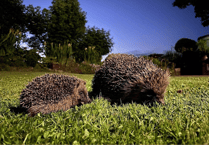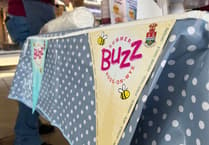A swan which was caught in twine in a Whitchurch graveyard, near Ross-on-Wye, has been given a chance of recovery thanks to the work of an RSPCA officer.
ACO Glenn Baird was able to disentangle the young swan and he took it to the Vale Wildlife Hospital in Gloucestershire where its condition is slowly improving.
A spokesperson for the hospital told the Ross Gazette that when the swan arrived it had a couple of infected wounds. it was given antibiotics and fluids. It is now being administered pain relief following examination by a vet.
The spokesperson explained that when the swan arrived at the sanctuary it was unable to stand, which is very serious, but she said it is now standing and walking, but is still very weak.
If the swan makes a full recovery it will be released at a spot near to where it was found but the spokesperson added that it still has a long way to go.
The RSPCA officer who rescued the swan tweeted: “ACO Glenn Baird had a Spoooooky #Ghostbuster rescue of a young swan tangled up in a fence next to a dark graveyard in Ross-on-Wye. Fastest rescue ever Glenn said, owls hooting and eerie sounds. Swan now at @wildliferescuer for observation.”The RSPCA is reminding people of the dangers of netting following the rescue.RSPCA animal collection officer Glenn Baird rescued a swan whose neck and wing had become trapped in netting.He said: “This poor swan had got himself into a real tangle with his wing, leg and neck caught in the netting and had no way of freeing himself. “Netting like this is potentially lethal to wild animals. They can end up with life-threatening injuries by getting their legs, wings or beaks tangled in the netting or, if not spotted by anyone who can help free them, they can eventually die from dehydration or starvation.“Luckily for this bird, he was spotted and I was able to use my rescue equipment and cut him free before taking him to a wildlife centre to recover before releasing back into the wild.”The RSPCA receives hundreds of calls every year to rescue animals - often wildlife - who have become tangled in sports netting, mesh fencing or fishing litter. Adam Grogan, RSPCA’s head of wildlife, said: “Many people might not realise how dangerous netting is to wild animals so we want to raise awareness and hopefully stop animals from being injured - sometimes fatally - after getting caught up in netting.“Last year our inspectors rescued more than 1,000 animals tangled in netting. Some animals survive, but very sadly many animals suffer fatal injuries, often as a result of struggling to get free.“If they go unnoticed even for a short time, they can really suffer. The tight net can cut off the blood supply to their limbs, damage bones where they have tried to frantically escape, or worst of all, they could be strangled to death.“We have had cases of animals so badly tangled that they are brought in to our wildlife centres with the netting still round their bodies and the only way to safely free them is to sedate them.“There is one simple way to prevent this from happening - please remove any kind of netting including sports nets after use and store them safely away. It only takes a few minutes and yet it could save an animal from suffering a horrible death.“Where netting can’t be removed, such as pond or fruit netting, we recommend replacing them with solid metal mesh.”If you see an animal tangled in netting, do not try to free them yourself - call the RSPCA immediately on 0300 1234 999.





Comments
This article has no comments yet. Be the first to leave a comment.